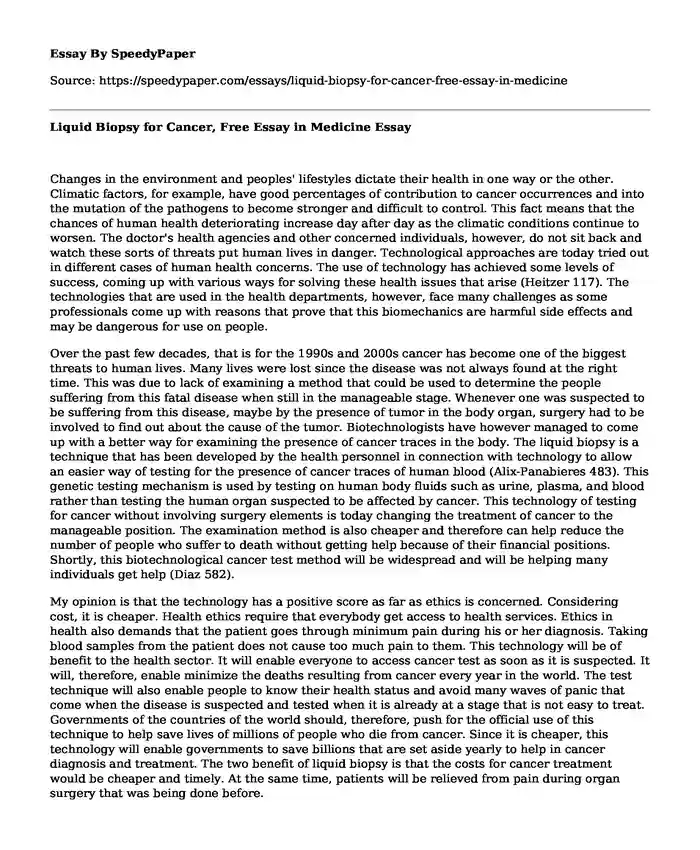Changes in the environment and peoples' lifestyles dictate their health in one way or the other. Climatic factors, for example, have good percentages of contribution to cancer occurrences and into the mutation of the pathogens to become stronger and difficult to control. This fact means that the chances of human health deteriorating increase day after day as the climatic conditions continue to worsen. The doctor's health agencies and other concerned individuals, however, do not sit back and watch these sorts of threats put human lives in danger. Technological approaches are today tried out in different cases of human health concerns. The use of technology has achieved some levels of success, coming up with various ways for solving these health issues that arise (Heitzer 117). The technologies that are used in the health departments, however, face many challenges as some professionals come up with reasons that prove that this biomechanics are harmful side effects and may be dangerous for use on people.
Over the past few decades, that is for the 1990s and 2000s cancer has become one of the biggest threats to human lives. Many lives were lost since the disease was not always found at the right time. This was due to lack of examining a method that could be used to determine the people suffering from this fatal disease when still in the manageable stage. Whenever one was suspected to be suffering from this disease, maybe by the presence of tumor in the body organ, surgery had to be involved to find out about the cause of the tumor. Biotechnologists have however managed to come up with a better way for examining the presence of cancer traces in the body. The liquid biopsy is a technique that has been developed by the health personnel in connection with technology to allow an easier way of testing for the presence of cancer traces of human blood (Alix-Panabieres 483). This genetic testing mechanism is used by testing on human body fluids such as urine, plasma, and blood rather than testing the human organ suspected to be affected by cancer. This technology of testing for cancer without involving surgery elements is today changing the treatment of cancer to the manageable position. The examination method is also cheaper and therefore can help reduce the number of people who suffer to death without getting help because of their financial positions. Shortly, this biotechnological cancer test method will be widespread and will be helping many individuals get help (Diaz 582).
My opinion is that the technology has a positive score as far as ethics is concerned. Considering cost, it is cheaper. Health ethics require that everybody get access to health services. Ethics in health also demands that the patient goes through minimum pain during his or her diagnosis. Taking blood samples from the patient does not cause too much pain to them. This technology will be of benefit to the health sector. It will enable everyone to access cancer test as soon as it is suspected. It will, therefore, enable minimize the deaths resulting from cancer every year in the world. The test technique will also enable people to know their health status and avoid many waves of panic that come when the disease is suspected and tested when it is already at a stage that is not easy to treat. Governments of the countries of the world should, therefore, push for the official use of this technique to help save lives of millions of people who die from cancer. Since it is cheaper, this technology will enable governments to save billions that are set aside yearly to help in cancer diagnosis and treatment. The two benefit of liquid biopsy is that the costs for cancer treatment would be cheaper and timely. At the same time, patients will be relieved from pain during organ surgery that was being done before.
Work cited
Heitzer, Ellen, Peter Ulz, and Jochen B. Geigl. "Circulating tumor DNA as a liquid biopsy for cancer." Clinical chemistry 61.1 (2015): 112-123.
Alix-Panabieres, Catherine, and Klaus Pantel. "Clinical applications of circulating tumor cells and circulating tumor DNA as liquid biopsy." Cancer discovery 6.5 (2016): 479-491.
Diaz Jr, Luis A., and Alberto Bardelli. "Liquid biopsies: genotyping circulating tumor DNA." Journal of clinical oncology 32.6 (2014): 579-586.
Cite this page
Liquid Biopsy for Cancer, Free Essay in Medicine. (2022, Mar 11). Retrieved from https://speedypaper.net/essays/liquid-biopsy-for-cancer-free-essay-in-medicine
Request Removal
If you are the original author of this essay and no longer wish to have it published on the SpeedyPaper website, please click below to request its removal:
- Free Essay: Effects of Cheating in a Relationship on the Example of Zora Neale's Novel
- Clarity of the Law in Decision-Making Process - Essay Example
- New Subsidiary for Pfizer Pharmaceutical - Free Essay
- Masters of Money, Boom Bust Boom - Free Essay with Moview Reviews
- Essay Sample on Capitalism in America
- Free Essay Describing the Case Study of the Academic Background and Career Falsification
- Essay Sample: Examining Nike Inc.'s Global Processes and Impact on the World
Popular categories





